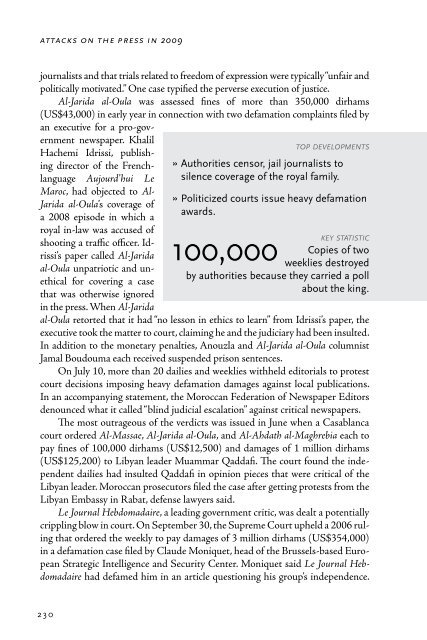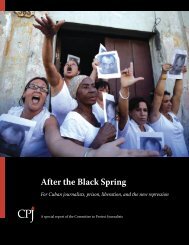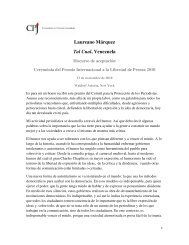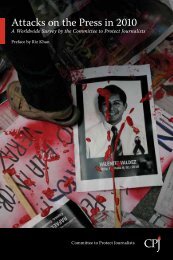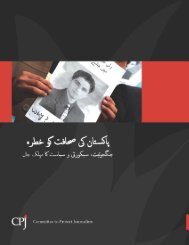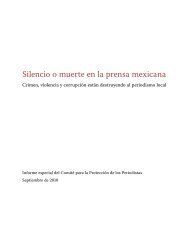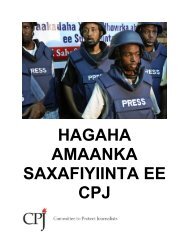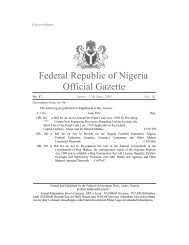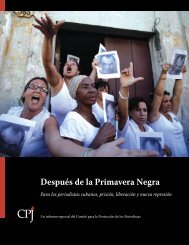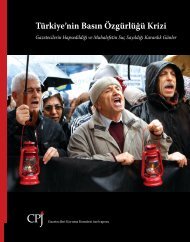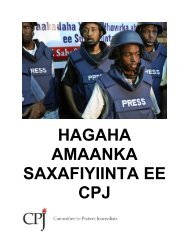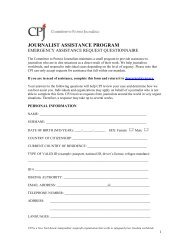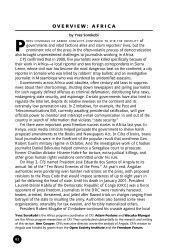Attacks on the Press - Committee to Protect Journalists
Attacks on the Press - Committee to Protect Journalists
Attacks on the Press - Committee to Protect Journalists
- No tags were found...
Create successful ePaper yourself
Turn your PDF publications into a flip-book with our unique Google optimized e-Paper software.
attacks <strong>on</strong> <strong>the</strong> press in 2009middle east and north africa: sudanjournalists and that trials related <strong>to</strong> freedom of expressi<strong>on</strong> were typically “unfair andpolitically motivated.” One case typified <strong>the</strong> perverse executi<strong>on</strong> of justice.Al-Jarida al-Oula was assessed fines of more than 350,000 dirhams(US$43,000) in early year in c<strong>on</strong>necti<strong>on</strong> with two defamati<strong>on</strong> complaints filed byan executive for a pro-governmentnewspaper. KhalilHachemi Idrissi, publishingdirec<strong>to</strong>r of <strong>the</strong> FrenchlanguageAujourd’hui LeMaroc, had objected <strong>to</strong> Al-Jarida al-Oula’s coverage ofa 2008 episode in which aroyal in-law was accused ofshooting a traffic officer. Idrissi’spaper called Al-Jaridaal-Oula unpatriotic and unethicalfor covering a casethat was o<strong>the</strong>rwise ignoredin <strong>the</strong> press. When Al-Jaridat o p developments»»Authorities censor, jail journalists <strong>to</strong>silence coverage of <strong>the</strong> royal family.»»Politicized courts issue heavy defamati<strong>on</strong>awards.100,000key statisticCopies of twoweeklies destroyedby authorities because <strong>the</strong>y carried a pollabout <strong>the</strong> king.al-Oula re<strong>to</strong>rted that it had “no less<strong>on</strong> in ethics <strong>to</strong> learn” from Idrissi’s paper, <strong>the</strong>executive <strong>to</strong>ok <strong>the</strong> matter <strong>to</strong> court, claiming he and <strong>the</strong> judiciary had been insulted.In additi<strong>on</strong> <strong>to</strong> <strong>the</strong> m<strong>on</strong>etary penalties, Anouzla and Al-Jarida al-Oula columnistJamal Boudouma each received suspended pris<strong>on</strong> sentences.On July 10, more than 20 dailies and weeklies withheld edi<strong>to</strong>rials <strong>to</strong> protestcourt decisi<strong>on</strong>s imposing heavy defamati<strong>on</strong> damages against local publicati<strong>on</strong>s.In an accompanying statement, <strong>the</strong> Moroccan Federati<strong>on</strong> of Newspaper Edi<strong>to</strong>rsdenounced what it called “blind judicial escalati<strong>on</strong>” against critical newspapers.The most outrageous of <strong>the</strong> verdicts was issued in June when a Casablancacourt ordered Al-Massae, Al-Jarida al-Oula, and Al-Ahdath al-Maghrebia each <strong>to</strong>pay fines of 100,000 dirhams (US$12,500) and damages of 1 milli<strong>on</strong> dirhams(US$125,200) <strong>to</strong> Libyan leader Muammar Qaddafi. The court found <strong>the</strong> independentdailies had insulted Qaddafi in opini<strong>on</strong> pieces that were critical of <strong>the</strong>Libyan leader. Moroccan prosecu<strong>to</strong>rs filed <strong>the</strong> case after getting protests from <strong>the</strong>Libyan Embassy in Rabat, defense lawyers said.Le Journal Hebdomadaire, a leading government critic, was dealt a potentiallycrippling blow in court. On September 30, <strong>the</strong> Supreme Court upheld a 2006 rulingthat ordered <strong>the</strong> weekly <strong>to</strong> pay damages of 3 milli<strong>on</strong> dirhams (US$354,000)in a defamati<strong>on</strong> case filed by Claude M<strong>on</strong>iquet, head of <strong>the</strong> Brussels-based EuropeanStrategic Intelligence and Security Center. M<strong>on</strong>iquet said Le Journal Hebdomadairehad defamed him in an article questi<strong>on</strong>ing his group’s independence.The organizati<strong>on</strong> had issued a report <strong>on</strong> <strong>the</strong> disputed Western Sahara that <strong>the</strong>newspaper said closely reflected <strong>the</strong> official view of <strong>the</strong> Moroccan government.In July, CPJ wrote <strong>to</strong> <strong>the</strong> king <strong>to</strong> express grave c<strong>on</strong>cerns about “<strong>the</strong> c<strong>on</strong>tinueduse of <strong>the</strong> courts <strong>to</strong> suppress freedom of expressi<strong>on</strong>.” CPJ also wrote <strong>to</strong> U.S.Secretary of State Hillary Rodham Clint<strong>on</strong> in Oc<strong>to</strong>ber <strong>to</strong> urge her <strong>to</strong> “impressup<strong>on</strong> Moroccan authorities that a free press is a crucial comp<strong>on</strong>ent of any freesociety.” Clint<strong>on</strong> at <strong>the</strong> time was <strong>on</strong> her way <strong>to</strong> Marrakesh, where <strong>the</strong> Moroccangovernment was about <strong>to</strong> host <strong>the</strong> Forum for <strong>the</strong> Future, a regi<strong>on</strong>al c<strong>on</strong>ference <strong>on</strong>freedom and democracy.SUDANSudanese journalists worked amid political uncertaintyand severe restricti<strong>on</strong>s. Pervasive official censorship restricted journalists fromclosely reporting <strong>on</strong> <strong>the</strong> tumultuous events of 2009: The Internati<strong>on</strong>al CriminalCourt (ICC) issued an arrest warrant for President Omar Hassan al-Bashir,sporadic fighting c<strong>on</strong>tinued in <strong>the</strong> devastated regi<strong>on</strong> of Darfur, and a spike inethnic violence in South Sudan sparked fears of renewed warfare. Security agentsprevented coverage of <strong>to</strong>pics deemed <strong>to</strong> be sensitive, including Darfur, <strong>the</strong> ICC,human rights issues, official corrupti<strong>on</strong>, <strong>the</strong> expulsi<strong>on</strong> of aid agencies, and statecensorship itself. The legislature passed a stringent new press law, dashing hopesthat <strong>the</strong> repressive 2004 press law would be replaced with legislati<strong>on</strong> up <strong>to</strong> internati<strong>on</strong>alstandards. Though <strong>the</strong> government announced an end <strong>to</strong> prior censorshipin September, edi<strong>to</strong>rs were unc<strong>on</strong>vinced this would lead <strong>to</strong> significantchange. Many local journalists feared that official regulati<strong>on</strong>s and widespreadself-censorship could stifle hopes for a free and fair campaign in <strong>the</strong> lead-up <strong>to</strong>his<strong>to</strong>ric nati<strong>on</strong>al electi<strong>on</strong>s scheduled for 2010.The planned electi<strong>on</strong>s, which have been postp<strong>on</strong>ed multiple times, are a centralc<strong>on</strong>diti<strong>on</strong> of Sudan’s north-south peace process. In January 2005, Sudan endeda two-decade civil war between <strong>the</strong> north’s Arab-Muslim elite and <strong>the</strong> south’simpoverished n<strong>on</strong>-Muslim populati<strong>on</strong> with <strong>the</strong> signing of <strong>the</strong> ComprehensivePeace Agreement (CPA). As part of <strong>the</strong> agreement, <strong>the</strong> ruling Islamist Nati<strong>on</strong>alC<strong>on</strong>gress Party and <strong>the</strong> Sudan People’s Liberati<strong>on</strong> Movement formed a governmen<strong>to</strong>f nati<strong>on</strong>al unity led by al-Bashir. Meanwhile, <strong>the</strong> c<strong>on</strong>flict in Darfur, whichis thought <strong>to</strong> have caused hundreds of thousands of deaths, c<strong>on</strong>tinued <strong>to</strong> simmerdespite <strong>the</strong> presence of a U.N.-backed regi<strong>on</strong>al peacekeeping force.Both <strong>the</strong> CPA and <strong>the</strong> 2005 interim c<strong>on</strong>stituti<strong>on</strong> affirm <strong>the</strong> rights of freeexpressi<strong>on</strong> and press freedom. Despite <strong>the</strong>se guarantees, authorities in Khar<strong>to</strong>umhave c<strong>on</strong>structed an oppressive censorship regime through a variety of mech-230231


